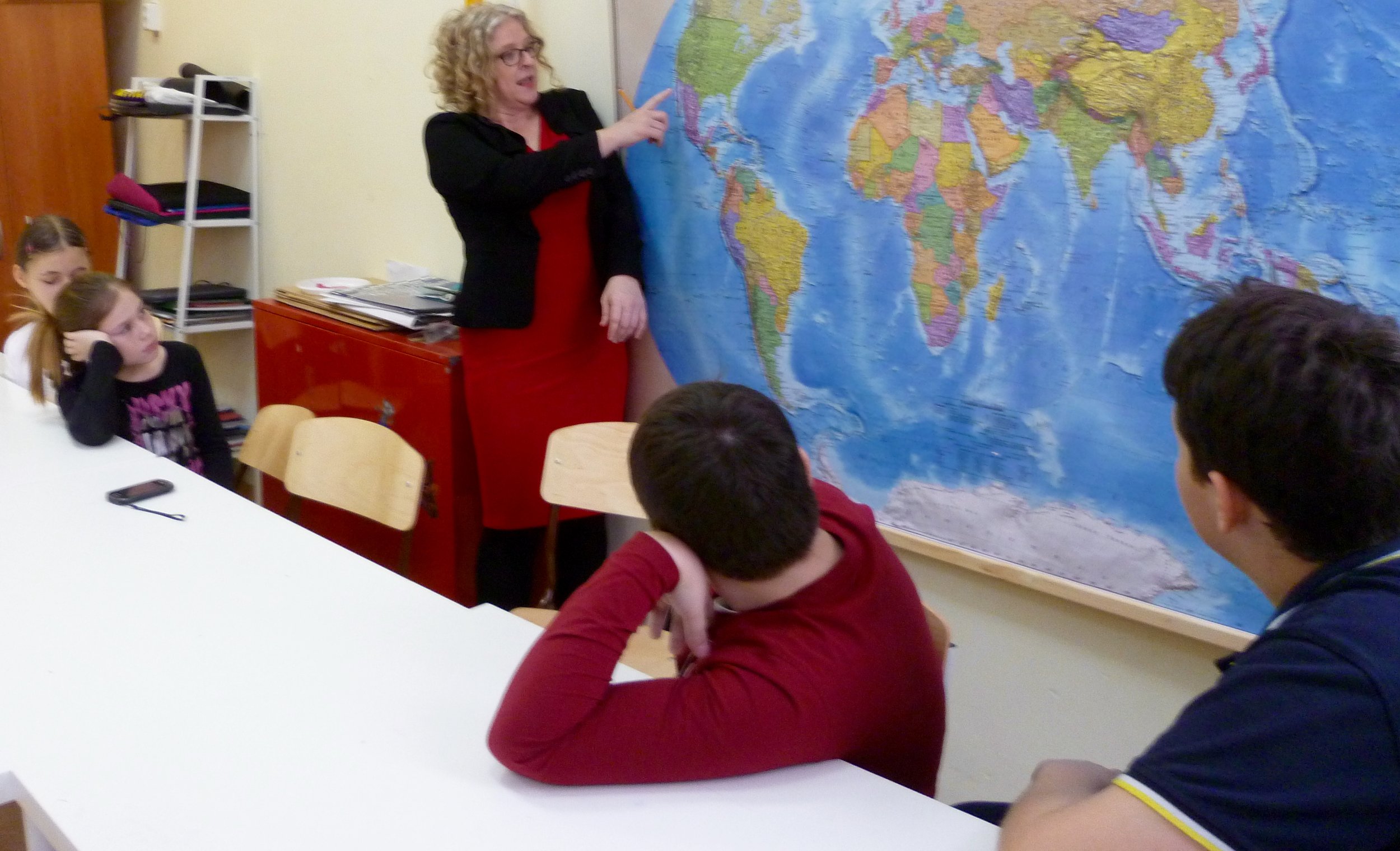Being an American Kid in a Foreign Country
My second day in Ufa contained an unexpected burst of joy: I met two eleven-year-old American girls studying in a Russian school.
There’s a backstory here. When I was ten, my Dad moved us to Spain for his work. At the time, IBM was expanding dramatically and Spain was the next frontier for both the company and Dad. But this was not the modern, European-Union country that everyone thinks of today. The Spain I met, as a ten-year-old, had only recently emerged from a long, dark period of dictatorship under Generalísimo Francisco Franco. The country was a complete anomaly in an otherwise contemporary Europe. Everything was just a little, or more than a little, off. As for me, I didn’t speak Spanish, I wasn’t Catholic, and, with my long, blonde pigtails and my Coke-bottle glasses, I looked like an alien– not just a foreigner, but an actual space alien. In time, I grew to love Spain and my Spanish friends, but it was a life-altering struggle to adapt to my new world. It turned me into the weirdo that I am today.
Lyalya, my Ufa friend, moonlights teaching history at a Montessori elementary school. We made a short stop there supposedly for the benefit of the kids studying English. It turned out to actually be for my benefit, but whatever. While I was sitting in the teachers’ lounge getting ready to go into the classroom, a long-haired girl came up to me and asked in English what my name was. I told her it was Rachel and then we started a conversation in Russian. It wasn’t until she told me that she was from Indiana that I realized how bizarre it was that we were speaking in Russian. “What are you doing in Ufa???!!??” I blurted in English. It turns out that her parents are English teachers. She’s been living here quite a while already and prefers it to the U.S. because she has more friends here.
Charmed, I went with her into the classroom ready to do my little “I am an American– Ask me anything!” show. But, you know, these kids already have their own real-life American to talk to every day. What could they possibly want to know from me? That was just one reason I felt odd going into the classroom. The other was that I was wearing a slinky red dress because Lyalya and I were going to the theater later. It felt a little too va-va-va-voom for elementary school but I just slipped on a blazer and hoped for the best. First I explained where I live:
Then the students went around the room, welcoming me to Ufa. One girl’s English sounded suspiciously, casually American. And NOT the girl I had already talked to. Turned out she was from Alaska. Well, heck, we’ve got our own little expat community here in this Ufa school!
Their English teacher, unlike my childhood English teacher in Spain, spoke excellent English and was not afraid to let the kids have a bit of fun with their language learning. So while I had expected to figuratively give a song-and-dance about being an American, instead I was treated to a literal song and dance from students not shy about hamming it up:
I sat there watching the kids, including the two American girls, unselfconsciously joking around and playing. Is this kind of openness something that can be taught at any age or do you really have to experience it firsthand as a youngster? I thought about those two girls and the wide-open possibilities in their futures.
Being an American kid abroad is probably different than being any other kind of kid in a foreign country. Americans, for better and for worse, are universally known around the world. Everyone watches our movies, our T.V. shows. Everyone listens to our music and knows our pop stars. And so, from a very young age, most people become incredibly curious about the U.S. So when you’re the new, foreign kid in class, the other kids treat you like you are an exciting novelty. In Spain in the 1980s, they treated me like I was royalty. Everyone wanted to be my friend. At recess I was swarmed by children of all ages, peppering me with questions that I mostly didn’t understand. They always included me in games although I wasn’t good at them. Even after the newness wore off, I was still treated as if I carried a whiff of the extraordinary.
This is decidedly not the treatment most foreign children experience in U.S. schools, where foreigners are nearly universally met with a combination of condescension and distrust, particularly foreigners that hail from south of the border.
Because I was treated so well, seeing the good in other cultures automatically came easy to me and I predict it will come easy for these two girls, too. We share a secret that maybe not so many Americans do: our culture isn’t any better than anyone else’s. We’re just different, not better. Maybe lots of Americans actually know this. But I got to learn it so early and in such a visceral way that it’s given me a kind of freedom that some people don’t even realize they lack.
At the end of class, I couldn’t help but gush to the girls. “It is SO GREAT that you are living here at this age! When you grow up you’re going to be so glad you did this!” They politely nodded and I knew I was being a batty old lady. But so what. That’s what you do when you meet your younger self.





